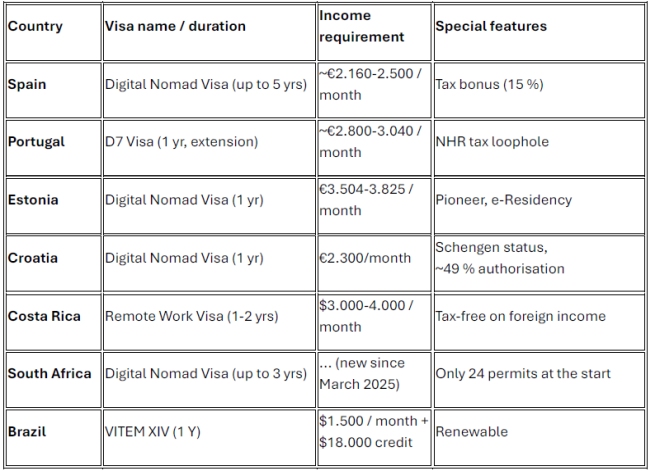- within Immigration topic(s)
- in United States
- with Senior Company Executives and HR
- in United States
In 2025, the digital nomad movement will reach new heights worldwide. More and more countries are recognising the potential of location-independent professionals for their economy and are setting up special visa programmes to specifically address this target group. It's no longer just about sun, sand and Wi-Fi - it's about economic stimulus, tax incentives and a new form of global mobility.
Global increase & new visa initiatives
The number of digital nomads is growing steadily. Countries such as Spain, Portugal, Estonia, Thailand and Brazil now offer attractive long-term visas with clear income requirements and tax benefits. New additions include South Korea, South Africa and Slovenia, which is participating for the first time and will be offering a one-year digital nomad visa from November 2025.
New Zealand also stands out: it has recently officially allowed people to work remotely for foreign employers during a tourist stay - without an additional work permit. This model could set a precedent and encourage other countries to make their residence laws more flexible.
Visa conditions at a glance
The requirements for a digital nomad visa vary greatly, but are usually similar:
- Minimum monthly income of between 2,000 and 4,000 euros / USD
- Validity period usually 1 year, sometimes extendable up to 5 years (e.g. Spain, Portugal)
- Proof of health insurance, accommodation and remote work
- Some countries offer tax relief or even complete tax exemption on foreign income (e.g. Costa Rica, Mauritius)
Top destinations for digital nomads
Based on current developments, the following countries are currently considered particularly attractive:
- Spain: Extendable visa for up to 5 years, tax benefit of 15%
- Portugal: Solid programme with access to the EU, tax benefits through the NHR regime
- Slovenia: New to the game, clear rules, Schengen membership
- Thailand: 5-year visa with tropical lifestyle, but high income hurdle
- New Zealand: Flexible stay with legally permitted remote working
- Mauritius: Fast visa, favourable living conditions, tax-free
Turning away from investor visas - focus on talent
One notable trend is the withdrawal of classic "golden visa" programmes. Spain, for example, has abolished its property-based visa system and is now focussing more on qualified remote workers. This development illustrates that human capital is increasingly valued more highly than pure financial assets.
Countries & visas in comparison

Approvalrates (2024 / 2025)
- Croatia: ~48.8% (680 approved out of 1.393 applications) (nomadsembassy.com)
- Cyprus: Limited 500, all granted (nomadsembassy.com)
- Ecuador: 113 approvals 2022-23
- Estonia: 535 authorisations since 2020 (nomadsembassy.com)
- Greece: ~58% authorisation (1.693 / 2.918) (theguardian.com)
- Malta: 1.041 authorisations since start (nomadsembassy.com)
- Portugal: 2.600 permits since October 2022 (nomadsembassy.com)
- South Africa: 24 first permits in March 2025
Conclusion: Flexible working as a global way of life
By 2025, being a digital nomad will no longer be a marginal phenomenon, but part of a global transformation towards flexible, decentralised working models. If you fulfil the necessary requirements and inform yourself in good time, you can choose from dozens of attractive locations - whether for a few months or with the prospect of a long-term life abroad.
Tip: Anyone planning to go abroad as a digital nomad should find out about local laws, tax models and visa requirements at an early stage - and rely on reputable sources and experience reports.
The content of this article is intended to provide a general guide to the subject matter. Specialist advice should be sought about your specific circumstances.
[View Source]
